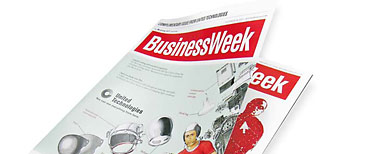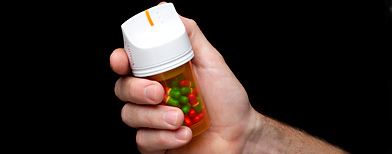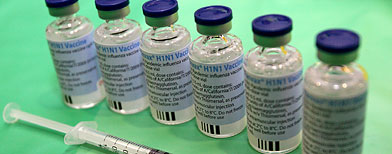- Flying Reptile May Have Snatched Dinosaurs in Midair
Fossils from a small flying reptile fill evolutionary gap.
- Giant Invasive Snakes Threaten U.S. Ecosystems Some giant snake species would pose a threat to U.S. ecological systems if they were ever established here, a new report finds.
- Birds Line Nests with Natural Antibacterials Why do birds line their nests with aromatic herbs?
Tuesday, October 13, 2009
Science Headlines
Snowe voting for Democrats' health care bill
The female maverick of the repugican party is Senator Olympia Snowe.
Deer plays linebacker, tackles kid
A 7-year-old Ohio boy playing a game of backyard football was tackled by a deer.
Ways to locate unclaimed money

Ways to locate unclaimed money
If you've ever been in one of these seven scenarios, you may have money owed to you.
"Even greedier than we imagined"
[T]hey've now hoisted themselves on their own insured petard. They've exposed themselves. If they had to compete with a public insurance plan, they couldn't get away with this threat. They couldn't pass on the extra costs. They'd have to compete with a public insurance option that forced them to give consumers the best deals possible.
Now's the time for Congress and the White House to say to the insurance industry: You want to play hardball? Okay. We'll play it, too. You didn't want a public insurance option. That was one of your conditions for supporting the bill. You wanted gigantic profits from having thirty million new paying customers and the market to yourself. The Senate Finance Committee and the White House agreed because they wanted your support and were afraid of the negative ads and hurricane of opposition you could finance. But you're even greedier than we imagined. And now you've demonstrated that greed to the American people. They don't want to turn over even more of their hard-earned money to you. So, insurance companies, we've got news for you. We're going to make sure Americans have the freedom to choose a public insurance option that's cheaper and better, and you're going to have to work hard to keep them your customers.
Insurance industry's top lobbyist makes case for the public option
The last paragraph of the article is most telling. The leader of America's Health Insurance Plans (AHIP), Karen Ignangi, spilled the beans. In doing so, she laid out the case for why we need a public option. Her industry doesn't want to insure people with "health problems":
Ms. Ignagni said her biggest concern was that the bill would require insurers to accept all applicants for several years before the government had any meaningful way to enforce a requirement for people to have insurance. In that gap, Ms. Ignagni predicted, many people with health problems are likely to enter the market.Imagine that. Her biggest concern is insuring people with health problems. And, as we know, the insurance industry has a very, very broad definition of "health problems." If insurers don't want all those people -- and Ignangi said they don't -- we really need a public option.
The repugican party has no future
Ford orders its largest recall ever

Ford orders its largest recall ever
A defective switch that could cause a fire forces Ford to recall 14.3 million vehicles.
Bloomberg's bold and possibly risky move

Bloomberg's bold and possibly risky move
A privately held company started by NY Mayor Michael Bloomberg plans to take over BusinessWeek.
An innovative way to remember your meds

An innovative way to remember your meds
A new Internet-connected vial cap that fits on regular pill bottles reminds you to take your medicine.
Signs that your house is overpriced

4 signs that your house is overpriced
If your house has been sitting on the market for months, something's wrong.
Misleading health foods busted

Misleading health foods busted
Beware of nutritious-sounding phrases used to gloss over unhealthy ingredients.
Warship built with WTC steel sets sail

Warship built with WTC steel sets sail
A Navy ship built with steel salvaged from the World Trade Center heads to New York.
Where billionaire ranks are booming

Where billionaire ranks are booming
Amid a global destruction of wealth, one country is bucking the trend.
Many still leery of swine flu vaccine

Many still leery of swine flu vaccine
Half of Americans say they worry about H1N1 vaccine safety and they may not get a shot.
Passenger Advocate Sues Delta for Allegedly Hacking Her E-Mail
Passenger Advocate Sues Delta for Allegedly Hacking Her E-Mail
Al-Qaeda 'faces funding crisis'
Swastika and Obama Carved Into Green At Lakeville Golf Course
Lead poisoning sickens nearly 1000 kids
Nearly 1,000 children living near smelting plants in China's central Henan province have tested positive for excessive lead levels in their blood, state media reported Tuesday.
Woman fired for eating boss' meatball
A German personal assistant has been fired for stealing after she ate a meatball from the plate of food she was preparing for her boss.
Woman slits husband's throat so she could meet internet lover
Elvis ranch on market for $6.5 million
It's arguably one of the largest pieces of Elvis Presley memorabilia ever: a 154.5-acre ranch in Horn Lake, Mississippi, once owned by the king of rock 'n' roll.
Expectant mother passes cancer on to unborn child
Are companies exploiting breast cancer campaigns?
 Walk into almost any store this month, and you'll be hit with a wash of pink products -- pink clogs, pink vegetable peelers, pink cleaning products, even pink food -- sold in support of Breast Cancer Awareness Month. Consumers, feeling as if they're participating in the effort to find a cure for the disease, are snapping up pink-tinged everything. And, as a result, nearly all big consumer-products companies are tacking pink ribbons onto their products.
Walk into almost any store this month, and you'll be hit with a wash of pink products -- pink clogs, pink vegetable peelers, pink cleaning products, even pink food -- sold in support of Breast Cancer Awareness Month. Consumers, feeling as if they're participating in the effort to find a cure for the disease, are snapping up pink-tinged everything. And, as a result, nearly all big consumer-products companies are tacking pink ribbons onto their products.Yet not everything is coming up roses. Some breast-cancer advocates, patients and survivors are questioning whether the pink-ribbon movement has gone too far, with companies seeking higher sales from cause-related packaging without pledging much -- if anything -- in return. It's left up to shoppers to read the labels on pink-packaged products and determine whether their purchase will actually help a breast-cancer charity or foundation, they say.
"If the label says, 'Money will go to support breast cancer,' well, what does that mean?" says Barbara Brenner, the executive director of advocacy group Breast Cancer Action. "If it says it will support breast cancer awareness without being specific, it's not going anywhere."
Daily Finance surveyed a display of pink-packaged products at a Kmart store and sought to decipher the language on each item. Perhaps the least informative packaging was a pink Swiffer sweeper, made by consumer-products giant Procter & Gamble (PG). The label sports a pink ribbon accompanied by the phrase "early detection saves lives."
So how does purchasing a pink Swiffer help the cause? It's unclear from the label, because it contains no information about how its purchase will help support breast-cancer causes. And, according to a Procter & Gamble spokeswoman, the company will only make a two-cent donation to the National Breast Cancer Foundation if a consumer uses a coupon from Procter & Gamble's brand saver coupon book, which was distributed in newspapers on Sept. 27. Without the coupon, the limited-edition pink packaging on the Swiffer is simply designed to draw awareness to the cause.
The packaging of another product, Herr's Whole Grain Pretzel Ribbons, proclaims that a portion of its sales will be donated to breast cancer awareness and research programs. But there's an asterisk accompanying that statement, which leads to a caveat that Herr's caps its donation at $15,000. A spokeswoman for Herr's didn't immediately return our call seeking a comment.
Capping donations is a particularly prevalent practice among corporations, and it's one that consumers should watch for. According to Samantha King, the author of Pink Ribbons, Inc.: Breast Cancer and the Politics of Philanthropy, "Consumers could be buying a product, and if the maximum has been reached, their product purchase doesn't help."
Part of the confusion about how a pink-ribbon purchase may support the cause can be tied to the fact that no one owns the image or oversees its use, says Brenner of Breast Cancer Action. And because of that, it's difficult to say how much has been raised to help breast-cancer charities, although it's likely in the tens of millions of dollars, King adds.
Of course, some argue that it doesn't matter how the money is raised as long as funds are being donated to help fight the disease. Breast-cancer patient Jeanne Sather, who writes the blog The Assertive Cancer Patient, disagrees.
"Breast cancer is a disease. Not a marketing opportunity," she wrote in an emailed response to Daily Finance's questions. "It also matters that the companies, with a few exceptions, are not donating their own money, they are just passing on their customers' money. Then they are making a profit on top of that --larger than the donation in many if not most cases--and patting themselves on the backs for being good citizens. This is wrong."
Yet that hasn't stopped corporations from thinking pink. And there's a pretty big reason why that's the case. According to a Boston Globe article about criticism of pink-branded products, research has shown that 79% of consumers would likely be swayed to switch to a brand aligned with a cause.
Hershey Co. (HSY), for one, says it's both a way to be competitive and support its philanthropic initiatives. The chocolate maker recently began selling a line of Bliss chocolates with pink packaging, which states that the candy maker will donate $300,000 this year in support of the Young Survivors Coalition.
"We see it not only as a competitive business strategy, but one that fits in with our corporate values," says Hershey spokeswoman Jody Cook. "We know the pink ribbon resonates well with our customer, and our main target for the Bliss brand is women and mothers, so it's a perfect fit."
Still, a purchase of Bliss chocolates won't result in a part of the sale going in support of the charity. Cook says Hershey's donation isn't tied to sales of the chocolates, and that the company is clear on its packaging about its donation. Since it's the first year Bliss products have incorporated pink-ribbon branding, the company has yet to determine how the campaign will affect sales of the chocolates, she says.
Yet while pink corporate campaigns have undoubtedly raised millions for breast cancer research and charities, the sheer number of pink-ribboned products makes cancer patients such as Sather feel exploited. Last year, Sather says, she switched grocery stores to Whole Foods (WFMI) simply because it didn't have "lots of pink schlock."
If consumers really want to help fight cancer, they should consider directly giving money to organizations such as Gilda's Club, Team Survivor or Breast Cancer Action, Sather says. Or offer to help a cancer patient personally, such as doing her grocery shopping, she adds.
Despite concerns raised by advocates, it's unclear when the tide of pink-labeled products will slow down. That's because buying pink may just be too simple for many consumers to resist. As Brenner of Breast Cancer Action says, "People have come to believe that if they just do what they're told by corporate America, whether buying a product or doing a walk, they'll solve the breast cancer problem and not have to think about it."
And I Quote
- Our constitution protects aliens, drunks and U.S. Senators.
- ~ Will Rogers
Gag order blocks Guardian from reporting on Parliament
In a violation of British free speech rights dating back to the 1688 Bill of Rights, The Guardian newspaper has been forbidden by court order from reporting on a question in Parliament. We don't know who raised the question, what it was about, or where you can find it.
Today's published Commons order papers contain a question to be answered by a minister later this week. The Guardian is prevented from identifying the MP who has asked the question, what the question is, which minister might answer it, or where the question is to be found.The Guardian is also forbidden from telling its readers why the paper is prevented - for the first time in memory - from reporting parliament. Legal obstacles, which cannot be identified, involve proceedings, which cannot be mentioned, on behalf of a client who must remain secret.
The only fact the Guardian can report is that the case involves the London solicitors Carter-Ruck, who specialize in suing the media for clients, who include individuals or global corporations...
The right to report parliament was the subject of many struggles in the 18th century, with the MP and journalist John Wilkes fighting every authority - up to the king - over the right to keep the public informed. After Wilkes's battle, wrote the historian Robert Hargreaves, "it gradually became accepted that the public had a constitutional right to know what their elected representatives were up to".
Vegetarian Spider
It may have eight legs, but this little guy prefers a vegetarian diet to flies and critters.
Asteroid isn't just a dry heap of rubble
 Two teams have found evidence of water ice on the asteroid 24 Themis – the find suggests asteroids could have delivered some water to the early Earth.
Two teams have found evidence of water ice on the asteroid 24 Themis – the find suggests asteroids could have delivered some water to the early Earth.Asteroid isn't just a dry heap of rubble
Out of your head
 It's surprisingly easy to lose touch with your physical being – such out-of-body experiences reveal how our brain generates a sense of self.
It's surprisingly easy to lose touch with your physical being – such out-of-body experiences reveal how our brain generates a sense of self.Leaving the body behind
No buts! Syrian president bans smoking in public
Syrian president bans smoking in public
Sleeping with the corpses
Texas man found asleep with corpse inside closet of vacant Texas home, faces drug charges
Illegal Chinese migrants nabbed at Arizona border
Science News
 | Remarkable slow motion film is taken of two lizards from Belize that seem to do the impossible - walk on water. |
| Scientists have proved that it is possible for a mother's cancer cells to be passed to her unborn child. | The first spider in the world known to have a predominantly vegetarian diet is described by scientists. |
High-tech fashion accessories

High-tech fashion accessories
These stylish pieces can double as USB devices, wireless headsets, and cell phones.
Best young entrepreneurs in America

Best young entrepreneurs in America
Some of these founders are barely out of their teens yet have attracted millions of dollars for their ideas.
Daily Almanac
There are 79 days left in the year.
Today In History October 13
Our Readers
Ankara, Ankara, Turkey
Adelaide, South Australia, Australia
Seevetal, Niedersachsen, Germany
Rotterdam, Zuid-Holland, Netherlands
Mechelen, Antwerpen, Belgium
Perth, Western Australia, Australia
Goose Bay, Newfoundland and Labrador, Canada
Kitchener, Ontario, Canada
Stockholm, Stockholms Lan, Sweden
Brisbane, Queensland, Australia
Budapest, Budapest, Hungary
Daily Horoscope
It's time to signal a cease-fire between you a close friend or significant other.
Can't you find a way to settle your differences?
Even agreeing that you'll never come to an agreement on the topic or situation at hand is progress.
While it may be difficult at first, speaking honestly to one another and putting aside any impulse to wound or hurt is the only thing that can help heal this rift.
Otherwise it may worsen, and that would be a shame.
OK, why didn't I get the memo?!
